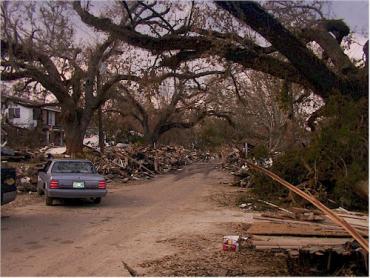
There was never a count of how many hundreds of people descended on Tallahassee the day before Hurricane Katrina hit. Frightened people, lost people, certainly very vulnerable people. I know something about them. I know they will never forget the extraordinary kindness and heart they were shown by residents of Florida's capital 10 years ago today. I know I won't.
My family was among them. My husband Mick and me, our daughter, two granddaughters, three cats and two ferrets.
Two months earlier we had moved from Florida's Treasure Coast to a brand-new home a stone's throw from the Gulf, close to bayou fishing and the blues, in Ocean Springs, Miss. We still had more than 30 years of unpacked possessions piled up in boxes in the garage on the night of Aug. 27, when we heard The Weather Channel's Jim Cantore predict a category 5 hurricane.
We thought of the kids and pets, that's all it took. "We're getting out of Dodge," said Mick, "fast as we can."
Tallahassee was our first thought -- a straight shot along I-10, where hotel rooms still would be plentiful. I got online and reserved what I believe was the last room in Tally where pets were accepted -- La Quinta Inn on Apalachee Parkway.
Before we left, we cleaned out the freezer, packed up hundreds of dollars of Colorado Prime steaks to take with us. To be honest, we weren't thinking all that straight. We just didn't want to come back to that much good food spoiled.
We evacuated finally in the middle of the night, about 2 a.m. Aug. 28, just ahead of the I-10 gridlock.
As far as we could figure out, Gulf Coast evacuees occupied every room at La Quinta, and every room at most hotels in the city. These were the lucky ones. The ones who -- except on television -- would never see the rising water and tidal surge about to destroy their homes and take the lives of some friends and relatives and separate others for years to come.
I've been sorry ever since I didn't have the presence to get full names and addresses of people we encountered in Tallahassee. As a journalist, it should have been my first thought. To this day, I can't explain why it never occurred to me to keep a more careful record.
But I can tell you from that first morning at La Quinta, Rafael -- manager at the motel, a naturalized citizen from Venezuela, sensed the human tragedy ahead of him. When we checked in, I told him we had all kinds of steaks and dozens of pounds of meat defrosting and suggested maybe he could pass it out to his staff.
"I'll be back in 45 minutes," he said. When he returned, he brought four new portable grills, tags still on them, and three bags of charcoal, plus a quantity of baked beans and cole slaw. "Give the meat here," he said. "I'm going to cook it for our guests. They're not all rich enough for our restaurants."
 And that's what Rafael did. He cooked our steaks and burgers and chops, everything we had -- the smell virtually emptied the rooms -- and it was all gone in less than an hour.
And that's what Rafael did. He cooked our steaks and burgers and chops, everything we had -- the smell virtually emptied the rooms -- and it was all gone in less than an hour.
More than once through the week he would tell me, "I think God put me here for this moment, to help these people." Rafael helped people walk their dogs, he pushed wheelchairs, he bought bathing suits for children who didn't bring one so they could swim in the pool.
Rafael's pure goodness was infectious. Throughout the week after the storm, the motel lobby, especially during breakfast, became a kind of social center where we would go for consolation, share our fears and listen to each other's stories. Guests wept openly, held each other's hands. It's no exaggeration to say we truly cared about each other, what would become of each other in the days and weeks ahead.
All over Tallahassee, not just at La Quinta, the heart-to-heart spirit was like a warm blanket. Tallahassee was a city of heroes.
Several shopping precincts around town had strung banners with messages for evacuees. Those will stay with me forever. I remember one near the mall on Apalachee that said, "Take heart, New Orleans, we love you." In yards in Midtown and in front of FSU buildings, we saw signs on stakes -- "God Bless You, Evacuees" and "Gulf Coast Will Rise Again" and "Katrina Won't Win."
Churches -- not all, but many of them -- kept their doors open and provided clergy or trained lay congregants to commune with evacuees 24/7.
The Shriners, I believe it was, hustled up a quick carnival day in the middle of the week for kids at the fairgrounds, complete with petting zoo and clowns. Then they brought posters around to all the hotels. Everthing free, the posters read. Just come.
When people saw our Mississippi license plate, we were feted like celebrities. Not just us -- all refugees from the Gulf Coast. The Subway shop down the road from our motel gave us free soft drinks and 6-inch sandwiches. Gas station employees ran up to the car windows with cartons of Coke, candy bars and ice cream on a stick. Restaurants like Cabo's offered evacuees free appetizers and desserts. Both family buffets on Apalachee Parkway took 25 percent off the price of our bill.
This was happening all over town, we were told. And I never found a local who resented us, never once had a feeling we had worn out our welcome.
At the end of the first week, Florida State had a home football game. The Tallahassee Democrat ran a story asking, Will city hotels throw out the evacuees so they can charge returning alumni and out-of-town fans the Big Bucks? Folks we talked to predicted they would do just that. And I understand one or two of the downtown hotels ordered an evacuee checkout. But for the most part, like La Quinta, doors and hearts stayed open to us.
Most evacuees had brought laptops and spent the first week after the storm trying to get news from home -- news about specific family members and specific neighborhoods -- scrolling through list upon list of victim and missing-person names. Rafael, when he could, let his guests use the office phone to call home; most of the time, they couldn't get through. Often what news they did get was heartbreaking.
As that first week wound down, we were all getting antsy to go home. Only problem was, the National Guard had closed the roads at the Mississippi border. Gas stations had run out anyway. We wouldn't get very far. It wasn't until the Saturday after the storm we were allowed back.
I promise you, we were luckier than every other guest at La Quinta. All we had in Mississippi was property.
Which, by the way, was badly damaged but salvageable, thanks to the fact that our house had been built on a street that really is slightly higher than the ones around us. We had seaweed in the mailbox, water damage like everyone else, damage that destroyed much of what was stored in those unopened boxes, and a tree that wind had driven through the roof. Our neighbors the next street over were not as lucky. They had nothing left. (Our next-door neighbor, who didn't evacuate, took the photo on this page on Sept. 1, 2005.)
And before I finish, one thing more about Tallahassee: the kindness to strangers ... abiding to the end. On the way out of town, when we stopped at a convenience store just off I-10 to fill up, a man in a Ford pickup jumped out of the cab and approached my husband. "I'd like to get this tank of gas for you, if you don't mind," he said. "I think I know where you're headed." He actually wanted to pay for our entire fill-up. Well, we didn't let him. But it was the first time in all those days in Tallahassee I let myself cry for me, for our family. I sobbed like a child in thanks for the sheer humanity we had encountered.
Day to day, Tallahassee has its ups and downs, I know -- we moved there in 2010. But even on the bad days, I never forget what a very special place it is. For many hundreds of us 10 years ago today -- people the city saw probably in our darkest hour -- it always will be.
Reach Nancy Smith at nsmith@sunshinestatenews.com or at 228-282-2423. Twitter: @NancyLBSmith.



Comments
Please call me.